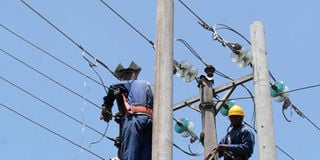End Kenya Power’s electricity monopoly

Kenya Power technicians working on a power line.
There have been two countrywide power outages recently.
At major facilities, such as JKIA, people were stranded in August. Despite Transport Cabinet Secretary Kipchumba Murkomen apologising, most of the country yet again sank into darkness last weekend.
During the incidents, perishable goods go to waste. Many businesses are running losses and premature deaths occur in hospitals.
Electricity monopoly is a complex issue that needs to be addressed from a broader perspective. Despite the concerned utility, Kenya Power and Lightning Company, issuing a statement over the blackouts, there is no permanent solution offered. Moreover, that has led to high prices of electricity, making it unaffordable to many families.
In addition, monopoly leads to the absence of innovation. Having no competitors, Kenya Power lacks the incentive to adopt modern technologies and infrastructure to improve its services. Instead, there is a lot of inefficiency in terms of electricity distribution, resulting in frequent blackouts.
Power monopoly in Kenya is caused by various factors. One is corruption, in the sense that lack of transparency has led to power production being concentrated in the hands of a few individuals in unethical ways that remain unclear, making it very difficult—almost impossible—for anybody else to join the sector.
If this issue is addressed, there will be more firms ready to produce (more affordable) power.
The monopoly also contributes to inequality in the economy. Thus, unequal allocation of resources and wealth has contributed to entrenching power within a few elites, including individuals and corporations, which lets them control the industry.
The Energy ministry must end the power monopoly immediately. The government should allow other companies to also produce power apart from the well-known giants in the business.
Monopoly in electricity generation and distribution needs to be quickly addressed to make it more equitable and sustainable. Allowing competition in electricity production and sale will also promote ethics and deal a blow to corruption in this sector, which will also end the problem of frequent blackout in Kenya.
Mercy Kachenge, Migori




